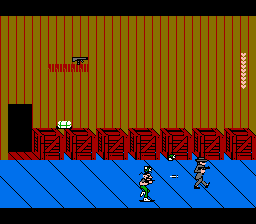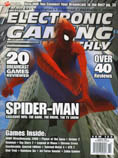|
tsr:
So during your heady freelance days...
tsr: Raid 2020? CB: Raid 2020, that's it, where you were like a drug cop or something? Oh my God, that was horrible! There were a couple like that...when I was doing the book, obviously I didn't have a lot of time to play the games before we wrote about them, and I'm embarassed by that today. Because maybe if I sat down and played Castlequest for 40 hours and that was the only game I owned, I might have enjoyed it a little bit more. But when you play it for half an hour, you're like, "This game sucks! This thing blows!" (laughs) And I didn't mind saying so, because I had to get that shit out the door. You might be interested in that book anyway, since there's a couple games that didn't come out in it, like Mike Ditka Big Play Football. tsr: Yeah, so I assume when VG&CE reviewed a game that turned out to be unreleased, that game was the existing, finished version? CB: Yeah. That's one of the things that not a lot of people know, like the people I see in the message board on your page. I can't speak for the other mags, but if you saw a review of a game in VG&CE, then we had a copy of it that we could play. Things like California Raisins; that existed. I just talked to the guy who wrote that review and I asked him, "Do you still have that game?!" and he said he sent it back. tsr: Sent it back to the trash? CB: (laughs) Well, I bet you'd kill for a copy of it! I don't know how often I'd play it, but...
tsr:
OK, so what about the best game?
tsr:
You were working for VG&CE only at the time, or were you freelancing for
other stuff?
CB: I know! When I look back at the older issues, I was surprised; it really seemed like they were more into the TG than the Genesis. tsr: How long did that magazine survive? CB: Maybe a couple of years. I started full-time for VG&CE in April of 1992; I worked on two issues of TurboPlay and then they killed it. It was brought back as Duo World, and I worked on one issue and it got turned over to the guys who were doing VideoGames. tsr: Do you know why they were into the Turbo so much? CB: I think they just had a really great relationship with NEC. It was a business deal, you know? The agreement between NEC and TurboPlay was just a guarantee of advertising. VG&CE said to NEC, "We'll publish this bi-monthly 32-page magazine if you guarantee to buy four pages of advertising every issue." And it was really nothing more than that...which was a cool way to do it, because NEC didn't have any control over the editorial. Later on the EGM guys did their own Turbo magazine called Duo Force or something, but that was completely under the control of TTI.
tsr:
Anyway, since you were working for VG&CE, I'm sure you were checking
out the other mags of the time. So I'm gonna name some magazines, and I
want you
to tell me what you think about them.
CB: (laughs) Yeah. I never really cared for Game Players, I always thought it was kind of dry and formulaic...I never really saw any information in Game Players that I hadn't already seen in another magazine. That was the first magazine I stopped buying. tsr: And finally, Electronic Gaming Monthly. CB: Well... I never really liked it. I used to buy it because I wanted to keep up with what they were doing. tsr: I used to think it was the ultimate magazine in the NES days. CB: Yeah, a lot of people did. I don't wanna sound like I'm all sour grapes, because they are pretty much the reason why VG&CE went down the drain. But the fact is they did a lot of things better than us. The thing that they always did that I wish we could have done was to go to the Consumer Electronics Show every year with this big hood attached to a camera and put it on every TV screen in the whole hall and take pictures of every single game that was on display. tsr: I see. CB: The fact that they were able to be that comprehensive... that was just something we couldn't do. We had, like, three guys working out of VG&CE, so we couldn't come close. But they also have a history of hiring guys who aren't really qualified to work on a video game magazine. In the early years, they had some guys who knew the history of the industry. Like Ed Semrad, whose name used to appear in the High Score section of the old Electronic Games magazine every month; guys who knew about more than just PlayStation. By the time EGM was taken over by Ziff-Davis, it seemed like they kept hiring people who not only didn't know much about video games, but were openly critical of old-school guys like Semrad. tsr: I liked them, but I always thought they leaned toward high-tech too much. There was a time when they would never give high scores to any Game Boy game, just because it was black and white. CB: Well, they had a guy who worked on Lynx games for Atari as one of the game reviewers. tsr: Oh, ok! (laughs) CB: So that had a lot to do with it.
|




